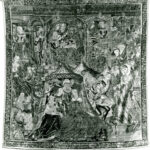Jean Guillaume Goldenberg was born on December 7, 1778, in Bliedingshausen, near Remscheid in Westphalia. At the age of forty-eight, in 1826, he left his home country for political reasons and found refuge in France, specifically in Bærenthal. There, he assumed the role of director of the existing forges under the name Couleaux aîné et Cie.
Goldenberg played a significant role in the growth of the metallurgical industry in Baerenthal. He expanded steel manufacturing, oversaw the construction of new refining furnaces and a rolling mill, and expanded the forge’s facilities. At its peak, the Baerenthal forge employed around ninety to a hundred workers, a considerable portion of the village’s population of approximately eight hundred fifty inhabitants. Through a merger with the Manufactures d’armes de Mutzig et de Klingenthal, the Baerenthal factory gained access to new markets, leading to further development. In 1833, Goldenberg received authorization to establish two small mills near the Zinsel bridge, one of which operated until 1932. Despite the annexation of the region in 1871, the company maintained a significant customer base, including the French state. However, steel production became less profitable after World War I due to modern techniques adopted elsewhere, leading to its discontinuation in 1923.
Goldenberg also played a crucial role in improving the sanitary conditions of the Zinsel valley. The area was plagued by numerous ponds, marshes, and dense forests, creating a humid climate that facilitated the spread of malaria through mosquitoes. In 1833, there were one hundred ninety cases of the disease, resulting in twenty-nine deaths. While the locals relied on various remedies and superstitious practices, Goldenberg took a more pragmatic approach. He drained numerous ponds and marshes at the foot of Ramstein and obtained permission from King Louis-Philippe’s administration to create extensive clearings through the forest along the Mühlthal road. These “sanitary trenches,” a method implemented in other regions since the reign of Louis XV, reduced the humidity, leading to a decline in mosquitoes and the eventual eradication of malaria.
Jean Guillaume Goldenberg passed away on February 18, 1858, at the age of eighty, after living a remarkably active and fulfilling life. He was laid to rest in the small cemetery near the Sainte-Catherine church in Baerenthal. His grave bears a significant epitaph: “France owes him the importation of an industry, and Baerenthal owes him the sanitation of the region.” In commemoration of the centenary of his death in 1958, the local section of Club Vosgien renovated his tomb and named a trail from Betteli through Arnsbourg to Untermühlthal in his honor.
Following Goldenberg’s passing, his sons continued his legacy in steel tool manufacturing. They established themselves in Saverne and Monswiller and supplied all the tools used for the construction of the Paris-Strasbourg railway around 1865. In recognition of their contributions, Emperor Napoleon III awarded them the Legion of Honor in 1869. Gustave Goldenberg, one of the sons, later became a deputy in the Bas-Rhin department. Gustave, a Commander of the Legion of Honor, was among the deputies who protested against the annexation of Alsace-Lorraine to Prussia in 1870. The Goldenberg family’s lineage ended with the death of Gustave Christmann in 1925. The Usines Goldenberg SA, eventually acquired by foreign investors, consolidated its operations in Monswiller-Zornhoff.
Sources
1. Charles Waltz, “Jean-Guillaume Goldenberg,” Bulletin du Club Vosgien, no. 106, 1960.
2. Maurice Wintz and Fabien Dersé, “La perception des friches dans les Vosges du Nord: entre nature abandonnée et nature ‘déjà là,'” Annales scientifiques de la réserve de Biosphère transfrontalière Vosges du Nord-Pfälzerwald, vol. 16, 2011-2012, pp. 214-235







